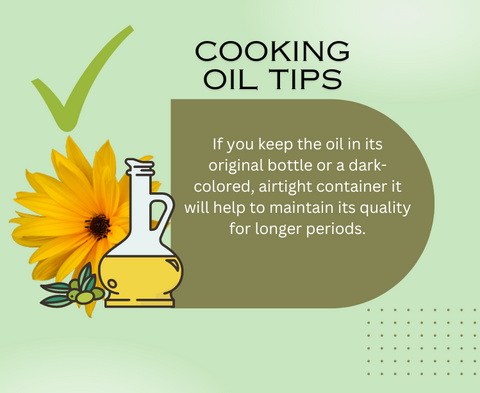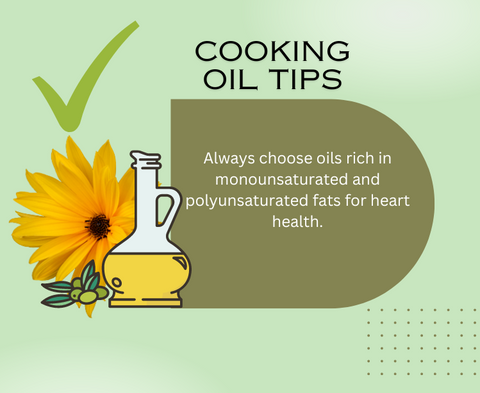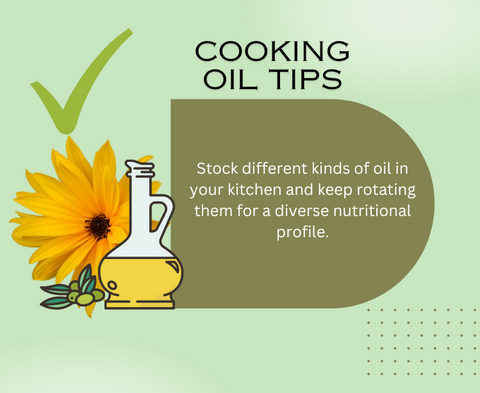Cooking oils play a pivotal role in our daily culinary endeavors, adding flavor, texture, and essential nutrients to our meals. However, not all oils are created equal when it comes to their impact on our health.
What Are Vegetable Cooking Oils?
Vegetable oils are liquid fats derived from various sources such as seeds, fruits, nuts, and grains. These oils are extracted through processes like pressing or solvent extraction. Some of the most commonly consumed vegetable oils include sunflower oil, olive oil, canola oil, palm oil, safflower oil, coconut oil, corn oil, peanut oil, cottonseed oil, and soybean oil etc.
Why Oil is Necessary for Cooking?
Cooking oils are used as a base ingredient. They infuse dishes with rich, aromatic flavors with enhancing the texture of cooked foods, from crispy to tender, depending on the cooking method. Oils help regulate cooking temperatures, preventing foods from sticking to the cooking surface and ensuring even heat distribution. Moreover, oils facilitate the absorption of vital nutrients like fat-soluble vitamins (A, D, E, and K) by the body, promoting overall health and wellness.

Side Effects of Cooking Oils
Excessive consumption or the use of certain types of oils can have adverse effects on health:
High Caloric Content: Oils are calorie-dense, with each gram containing approximately 9 calories.
Over Weight and Obesity: Overconsumption can contribute to weight gain and obesity.
Increased Risk of Heart Disease: Oils high in saturated and trans fats can raise cholesterol levels, increasing the risk of heart disease and stroke.
Digestive Issues: Certain oils may cause digestive discomfort and contribute to gastrointestinal issues when consumed in excess.
Potential for Oxidative Damage: Heating oils to high temperatures can lead to oxidative damage, producing harmful compounds that may contribute to inflammation and chronic diseases.
Checkout Dr Trust Weighing Scales for body weight measurement |
The 8 Best and Worst Oils For Your Health
Cooking oils are a staple in kitchens worldwide, but not all oils are created equal when it comes to their impact on health.
The 8 Best Oils for Your Health:
1. Extra Virgin Olive Oil (EVOO):
It has high content of monounsaturated fats and antioxidants like oleic acid and polyphenols.
- Research suggests that regular consumption of EVOO may reduce the risk of heart disease, lower blood pressure, and improve cholesterol levels. (1)
- EVOO is also known for its anti-inflammatory properties, which may help in the prevention of chronic diseases like cancer and Alzheimer's disease. (2)
2. Avocado Oil:
Avocado oil is also rich in monounsaturated fats. While antioxidants, such as lutein and zeaxanthin, have been linked to improved eye health and reduced inflammation.
- Studies have shown that avocado oil may improve heart health by lowering LDL cholesterol levels and increasing HDL cholesterol levels. (3)
3. Coconut Oil:
Coconut oil has received mixed reviews.
- Coconut oil can increase energy expenditure and promote weight loss when consumed in moderation. (4)
- It has also been shown to raise HDL cholesterol levels, which may have a protective effect against heart disease. (5)
4. Flaxseed Oil:
Flaxseed oil is a rich source of alpha-linolenic acid (ALA), an omega-3 fatty acid that is essential for heart health.
- Research suggests that ALA may reduce inflammation, improve blood vessel function, and lower the risk of cardiovascular disease. (6)
- Additionally, flaxseed oil contains lignans, plant compounds with antioxidant properties that may protect against certain types of cancer. (7)
5. Sesame Oil:
Sesame oil is a popular cooking oil in many cuisines and is known for its distinct nutty flavor and aroma.
- Studies have shown that sesame oil contains antioxidants like sesamol and sesamin, which have anti-inflammatory and anti-cancer properties. (8)
- Sesame oil is also rich in monounsaturated and polyunsaturated fats, which may contribute to improved heart health and cholesterol levels. (9)

6. Grapeseed Oil:
Grapeseed oil is known for its high smoke point, making it suitable for high-heat cooking methods.
- Rich in antioxidants like vitamin E and polyphenols, which may protect against oxidative stress and inflammation. (10)
- Improve cholesterol levels and reduce the risk of heart disease when used as part of a balanced diet.
7. Walnut Oil:
Walnut oil has rich, nutty flavor and high omega-3 fatty acid content.
- It improves heart health by reducing LDL cholesterol levels and inflammation.
- It contains antioxidants like vitamin E and polyphenols, which may protect against oxidative damage and age-related diseases.
Dr Trust Smart Glucometers help to monitor blood sugar levels |
8. Sunflower Oil:
Sunflower oil has a mild flavor and high smoke point.
- Research suggests that sunflower oil is rich in vitamin E and antioxidants like tocopherols, which have anti-inflammatory and cardio protective effects.
- Sunflower oil may also improve blood vessel function and lower cholesterol levels when used as part of a balanced diet.
Checkout Dr Trust Entire Range for A Healthier Lifestyle |
The 8 Worst Oils for Your Health:
1. Palm Oil:
Palm oil is widely used, but it is high in saturated fats, which can raise LDL cholesterol levels and increase the risk of heart disease.
2. Cottonseed Oil:
Cottonseed oil contains high levels of trans fats, which can raise LDL cholesterol levels and increase the risk of heart disease.
3. Soybean Oil:
Soybean oil is high in omega-6 fatty acids, which, when consumed in excess, can promote inflammation and increase the risk of chronic diseases like heart disease and obesity.
Also Read: 7 Practical Steps to Combat Obesity, Manage Diabetes, and Achieve Weight Loss
4. Corn Oil:
Corn oil is derived from corn kernels and is high in omega-6 fatty acids, which, when consumed in excess, can promote inflammation and increase the risk of chronic diseases like heart disease and obesity.
5. Vegetable Oil (Soybean/Corn Blend):
Vegetable oil blends, often made from soybean and corn oils, are commonly used in cooking and processed foods but are high in omega-6 fatty acids and may contribute to inflammation and chronic diseases.
6. Hydrogenated Oils:
Hydrogenated oils, solid at room temperature and are used in many processed foods. They can raise LDL cholesterol levels and increase the risk of heart disease.

7. Canola Oil:
Canola oil is often marketed as a healthy cooking oil due to its low saturated fat content, but it is high in omega-6 fatty acids, which can lead inflammation and increase the risk of chronic diseases.
Also Read: How to Prevent Deaths Due To Heart Attacks with Healthy Lifestyle
8. Safflower Oil:
Like canola oil Safflower oil is high in omega-6 fatty acids and excess consumption of it can lead to chronic diseases like heart disease and obesity.
How to Use the Cooking Oils for Lessening Bad Effects
To lessen the potential negative effects of oils on your health, it's essential to make informed choices and use them cautiously:
Choose Healthier Options: Opt for oils rich in monounsaturated and polyunsaturated fats, such as olive oil, avocado oil, and canola oil.
Practice Moderation: Measure portions carefully using tools like the Dr Trust Kitchen Scale for accurate portion control.
Monitor Cooking Temperatures: Avoid overheating oils to their smoke points. Use oils with higher smoke points, such as coconut oil and ghee, for high-heat cooking methods like frying.
Diversify Your Oil Choices: Rotate between different types of oils or experiment with blends of oils for a unique culinary experience.
Incorporate helping devices like kitchen scales in your kitchen and health monitoring devices like glucometer and BP monitor for routine wellness examinations.
Consider incorporating A Blood Pressure Monitor into your health routine to track your blood pressure levels.
FAQs
Q: Can I reuse cooking oil?
A: Reusing cooking oil is not recommended, as it can lead to the formation of harmful compounds due to repeated heating. It's best to use fresh oil for each cooking session.
Q: Are all saturated fats bad for health?
A: Not all saturated fats are considered unhealthy. Some sources of saturated fats, such as coconut oil and palm oil, contain medium-chain triglycerides (MCTs), which may have potential health benefits when consumed in moderation.
Q: Is olive oil suitable for high-heat cooking?
A: Extra virgin olive oil has a relatively low smoke point and is best suited for low to medium-heat cooking. For high-heat cooking methods, consider using refined olive oil or oils with higher smoke points, such as avocado oil or grapeseed oil.
Dr Trust Kitchen Scales are selected for their precision, user-friendly design, and seamless integration into your daily cooking routine.
Q: Why are commercial oils so bad?
A: The vast array of commercial vegetable seed oils undergo rigorous purification processes involving highly intensive mechanical and chemical methods. Prolonged use of these oils for cooking can pose significant health risks, potentially leading to various complications. Seed oils are notably rich in polyunsaturated fatty acids (PUFA), particularly linoleic acid.
Q: How to store cooking oil?
A: Keep it in a cool, dark place away from direct sunlight and heat sources like the stove or oven. Seal the bottle tightly to prevent exposure to air, which can cause oxidation and rancidity. Additionally, avoid storing oil near strong-smelling foods as it can absorb odors.
Consider utilizing Dr Trust Weighing Scales to keep track of your weight and monitor the effects of any vegetable oil on your weight.
Next time you're in the market for cooking oil, opt for healthier options. Be sure to carefully read the ingredient labels to make informed choices.
- Pay attention to the fat content.
- Look for an oil that has little to no trans fat and a lower proportion of saturated fats.
- Consider other beneficial ingredients such vitamins, minerals, antioxidants, polyphenols and other nutritious compounds.
- Use oils in moderation and monitor cooking temperatures to prevent oxidative damage.
- Incorporate Dr Trust health monitoring devices like the Smart Glucometer for comprehensive health management.
Checkout Dr Trust Entire Range for A Healthier Lifestyle |
References
- Estruch, R., Ros, E., & Salas-Salvadó, J. (2018). Primary Prevention of Cardiovascular Disease with a Mediterranean Diet Supplemented with Extra-Virgin Olive Oil or Nuts. New England Journal of Medicine, 378(25), e34. (1)
- Omar, S. H. (2010). Oleuropein in olive and its pharmacological effects. Scientia Pharmaceutica, 78(2), 133–154. (2)
- Wang, L., Tao, L., Gao, E., Bai, Y., & Shi, H. (2016). Avocado oil improves mitochondrial function and decreases oxidative stress in brain of diabetic rats. Molecular and Cellular Biochemistry, 422(1–2), 187–204. (3)
- Clegg, M. E. (2010). Medium-chain triglycerides are advantageous in promoting weight loss although not beneficial to exercise performance. International Journal of Food Sciences and Nutrition, 61(7), 653–679. (4)
- Nevin, K. G., & Rajamohan, T. (2004). Beneficial effects of virgin coconut oil on lipid parameters and in vitro LDL oxidation. (7)
- Pan, A., Chen, M., Chowdhury, R., Wu, J. H., Sun, Q., Campos, H., & Hu, F. B. (2012). α-Linolenic acid and risk of cardiovascular disease: a systematic review and meta-analysis. (6)
- Budryn, G., Zaczyńska, D., Rachwał-Rosiak, D., & Oracz, J. (2014). Antioxidant properties of flaxseed extracts in lipid systems. LWT - Food Science and Technology, 56(1), 137–142. (7)
- Pathak, N., Rai, A. K., Kumari, R., & Bhat, K. V. (2009). Value addition in sesame: A perspective on bioactive components for enhancing utility and profitability. Pharmacognosy Reviews, 3(6), 264–269. (8)
- Samaniego-Sánchez, C., Trujillo, M. J., Ruiz-Méndez, M. V., & García-Parrilla, M. C. (2017). Analysis of phenolic compounds in different parts of sesame (Sesamum indicum L.) seeds. Journal of Food Composition and Analysis, 61, 72–78. (9)
- Khaw, K. T., Barrett-Connor, E., & (1992). Dietary polyunsaturated fatty acids and cholesterol metabolism in humans. Proceedings of the Nutrition Society, 51(3), (10)















1 comment
Rritu
Very informative
Very informative